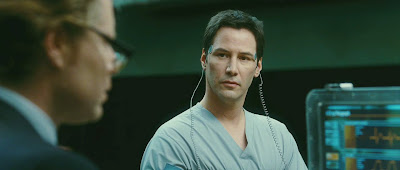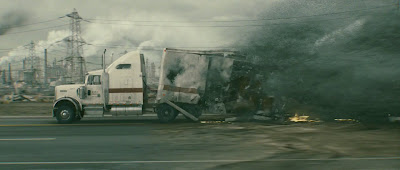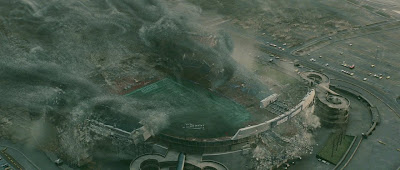
In the original The Day the Earth Stood Still (1951; my comments), produced at the exact mid-point between the creation of the atomic bomb in 1945 and the launching of the first artificial satellite in 1957, an alien comes to Earth to warn human beings that they need to give up their warlike ways if they are going to journey into space. There are other civilizations out there, see, and they won’t allow the humans to do them any harm. In fact, those other civilizations have even created a race of robot policemen whose job it is to wipe out anyone who poses a threat to the peace. Since humans have not yet made it into space, they do not pose such a threat — yet. But if humans do get that far, then it will be, shall we say, in their best interest to make sure that they come in peace.
In the remake, which comes out in December, the alien comes bearing a different message. This time, he tells human beings that they need to stop destroying the environment. But, of course, human beings are already destroying the environment. This time, the warning does not apply to something that we might do in the future; rather, it refers to something that we are doing now, and indeed to something that we have been doing for quite some time. So, not surprisingly, to judge from the following images — taken from the trailer — it would seem that the aliens or their robot policemen have decided not to waste any time, and are already setting out to punish the human race, to the point where they are atomizing entire neighbourhoods. (And what becomes of the people within them? Does the truck driver survive the destruction of his truck?)
Now, I’m just speculating here, but given that this movie is a major studio tentpole, it stands to reason that, despite all these apocalyptic overtones, the human race will not be wiped out in the end — not entirely, at any rate. That would probably be too bleak for the masses. But if my supposition is correct, then what, exactly, would stop the aliens from carrying out their mission?
Keanu Reeves, who plays the alien Klaatu in the new movie, may have given us a hint when he spoke to Kevin Buist of SpoutBlog at Comic-Con last week:
Yeah, part of the story this time is for, um– is a kind of– He’s in a human body but he’s an alien, it’s a part of this– The journey of the story is that he, uh, kind of becomes more human, kind of becomes affected being with the humans and being in a body that– The story is that he kind of goes towards– gets, uh– gets in touch with his humanness, I guess.
So if the human race does survive in the end — and I strongly suspect that it will — it seems like this will be, in part, a result of the “humanizing” of Klaatu and his increased sympathy or empathy for us.
This raises all sorts of other questions, chief among them the question of what sort of relationship Klaatu has with the robots this time. In the original film, and in the short story on which it was based, the big “twist” was that the robots were not the aliens’ servants but were, in some sense, their masters. If that is still the case, then it is not clear how the “humanizing” of Klaatu would have any effect on them; the technological overlords would still be free to ignore him, just as they ignore all the human beings from Earth.
But wait a minute: what does it mean that Klaatu has a “human body”? Is he a purely organic alien in a human body, a la, say, the Jeff Bridges character in Starman (1984)? Or is he an alien robot in a human body? Is he, perhaps, a member of the technological overlords, or an extension of their technology, who discovers along the way that there is something deeper and more important than mere machinery and its imperatives? If so, then that might explain how Klaatu would be able to influence those overlords. If Klaatu is, in a sense, “one of them”, and if they are all interconnected, then if he develops a “soul”, it could almost be as though they developed one, too.
Just speculation, of course. But if I am anywhere near the mark, then it would seem that this film challenges the faith in pure machinery that marked the original film, just as, say, Alex Proyas’s adaptation of I, Robot (2004) challenged the faith in pure machinery that characterized Isaac Asimov’s original novel. And note, by the way, that both Asimov’s I, Robot and the original version of The Day the Earth Stood Still came out in the early 1950s. A lot has changed in our attitudes towards machinery and modernity in the half-century since.
For that matter, I wonder what effect the “humanizing” of Klaatu may have on his status as a Christ-figure. The original Klaatu — played by Michael Rennie, who went on to play St. Peter in The Robe (1953) and Demetrius and the Gladiators (1954) — was a clear authority figure who came down to Earth to deliver a message to human beings. He may have, in some sense, matched some people’s conception of Jesus as a perfectly divine being who merely appeared human during his time on Earth. But there has been a significant emphasis in the last few decades on understanding the humanity of Jesus, even to the point where some basically orthodox Christians have asked what God might have “learned” from the experience of actually being human. It will be interesting to see if this film resonates with those developments in any way.
But the movie could also be completely different from anything that I have suggested here. Like I say, I’m just speculating.














